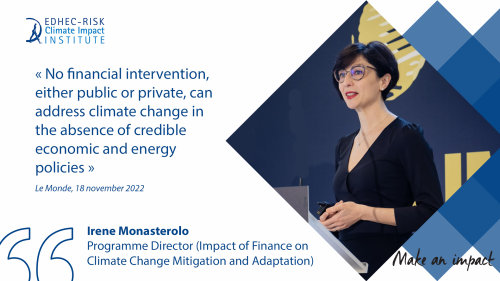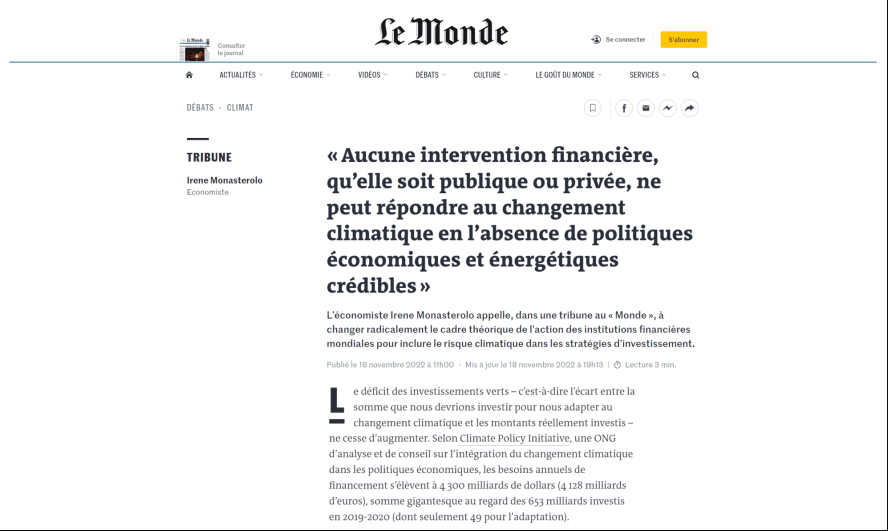
(Le Monde) Irene Monasterolo : "It is becoming urgent for international finance to make its own revolution"
The economist Irene Monasterolo calls, in a column for Le Monde, to radically change the theoretical framework of the action of global financial institutions to include climate risk in investment strategies.
Written on 21 Nov 2022.

Press review - Read the article published in Le Monde (in French) on 18 November by Irene Monasterolo, professor of climate finance at EDHEC Business School and director of the "Impact of Finance on Climate Change Mitigation and Adaptation" programme of the EDHEC-Risk Climate Impact Institute.
In an article published in French in Le Monde, Irene Monasterolo asks: "[...] Why is finance not flowing enough into mitigation and adaptation, in particular in emerging markets and developing economies? This is due to the uncertainty surrounding climate policies and the inconsistent signals sent to markets. No financial intervention, either public or private, can address climate change in the absence of credible economic and energy policies. Policy credibility is a key commitment device that makes investors’ expectations and risk assessment self-fulfilling, which in turn are key to reallocate capital into mitigation and adaptation."

To read this article, go directly on lemonde.fr
The question of the "Theory of Change" has been adressed by professor Irene Monasterolo in a paper published with the World Bank and entitled: "The Role of Green Financial Sector Initiatives in the Low-Carbon Transition : A Theory of Change", which discusses green finance sector initiative for decarbonization.
Green financial sector initiatives (GFSI) are expected to play a main role in climate mitigation. However, the conditions under which GFSI could enable the scaling up of green investments and the achievement of national climate mitigation objectives, while avoiding unintended effects on macroeconomic and financial stability, have still to be understood. Authors contribute to filling this gap by analyzing opportunities and challenges associated with the implementation of green financial sector initiatives. It also considers the specificities of green financial sector initiatives in emerging markets and developing economies, which are often characterized by budget constraints, debt sustainability concerns, and limited access to finance. The analysis focuses on green macroprudential policies, green monetary policies, and green public co-funding.
Multilateral financial institutions have a key role to play to scale up climate finance in emerging markets and low-income countries, and yet they are not delivering at their full potential. A main reason stands in the limits of the approaches used to conceptualize and assess the macro-financial criticality of climate risks and cobenefits of climate action. A theory of change (ToC) is needed to inform effective climate finance for a just transition - and to inform the allocation of the loss and damage fund just signed at COP27. A good example is the ToC by the World Bank, says Professor Monasterolo.
To know more about Irene Monasterolo, follow this link

